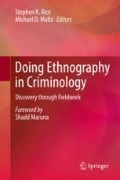Abstract
This chapter provides a conversational account of the process that underpins ‘doing’ autoethnography in criminological contexts. It is written in the form of a reflexive ‘conversation with myself’, that is, it poses a number of questions my former self asked of the method and its use, which are answered by my current self having employed autoethnography in my work on heroin users. This isn’t so much ‘what I wish I knew before I started’ but rather ‘what I wish someone had told me before I started’. The ultimate goal is to show how thinking about ‘selves’ in the research process can reveal new and interesting ways of thinking about criminological subjects, as well as to encourage more scholars to have a go at doing the same in their own work.
Access this chapter
Tax calculation will be finalised at checkout
Purchases are for personal use only
Notes
- 1.
I am most grateful to the editors for both my invitation to contribute to this volume and being given the stylistic freedom to write in this way.
- 2.
I call him ‘Tony’, because this isn’t his name.
References
Anderson, L. (2006). Analytic autoethnography. Journal of Contemporary Ethnography, 35(4), 373–395.
Becker, G., & Murphy, K. (1988). A theory of rational addiction. Journal of Political Economy, 96(4), 675–700.
Contreras, R. (2013). The stickup kids: Race, drugs, violence and the American dream. Berkeley, CA: University of California Press.
Denzin, N. K. (2014). Interpretive autoethnography (2nd ed.). London: Sage.
Ellis, C. (2004). The ethnographic I: A methodological novel about autoethnography. Walnut Creek, CA: AltaMira Press.
Ferrell, J. (2012). Autoethnography. In D. Gadd, S. Karstedt, & S. F. Messner (Eds.), The sage handbook of criminological research (pp. 218–230). London: Sage.
Jewkes, Y. (2011). Autoethnography and emotion as intellectual resources: Doing prison research differently. Qualitative Inquiry, 18(1), 63–75.
Lumsden, K., & Winter, A. (Eds.). (2014). Reflexivity in criminological research: Experiences with the powerful and the powerless. Basingstoke: Palgrave Macmillan.
Maruna, S., & Matravers, A. (2007). N = 1: Criminology and the person. Theoretical Criminology, 11(4), 427–442.
Muncey, T. (2010). Creating autoethnographies. London: Sage.
Sparks, R. (2002). Out of the ‘digger’: The Warrior’s honour and the guilty observer. Ethnography, 3(4), 556–581.
Wakeman, S. (2014). Fieldwork, biography and emotion: Doing criminological autoethnography. British Journal of Criminology, 54(5), 705–721.
Wakeman, S. (2016a). The case for criminological autoethnography. British Journal of Community Justice, 14(2), 75–78.
Wakeman, S. (2016b). The moral economy of heroin in ‘Austerity Britain’. Critical Criminology, 24(3), 363–377.
Young, J. (2011). The criminological imagination. Cambridge: Polity.
Author information
Authors and Affiliations
Corresponding author
Editor information
Editors and Affiliations
Rights and permissions
Copyright information
© 2018 Springer International Publishing AG, part of Springer Nature
About this chapter
Cite this chapter
Wakeman, S. (2018). Doing Criminological Autoethnography: Learning from Conversations with Ourselves. In: Rice, S., Maltz, M. (eds) Doing Ethnography in Criminology. Springer, Cham. https://doi.org/10.1007/978-3-319-96316-7_27
Download citation
DOI: https://doi.org/10.1007/978-3-319-96316-7_27
Published:
Publisher Name: Springer, Cham
Print ISBN: 978-3-319-96315-0
Online ISBN: 978-3-319-96316-7
eBook Packages: Law and CriminologyLaw and Criminology (R0)

